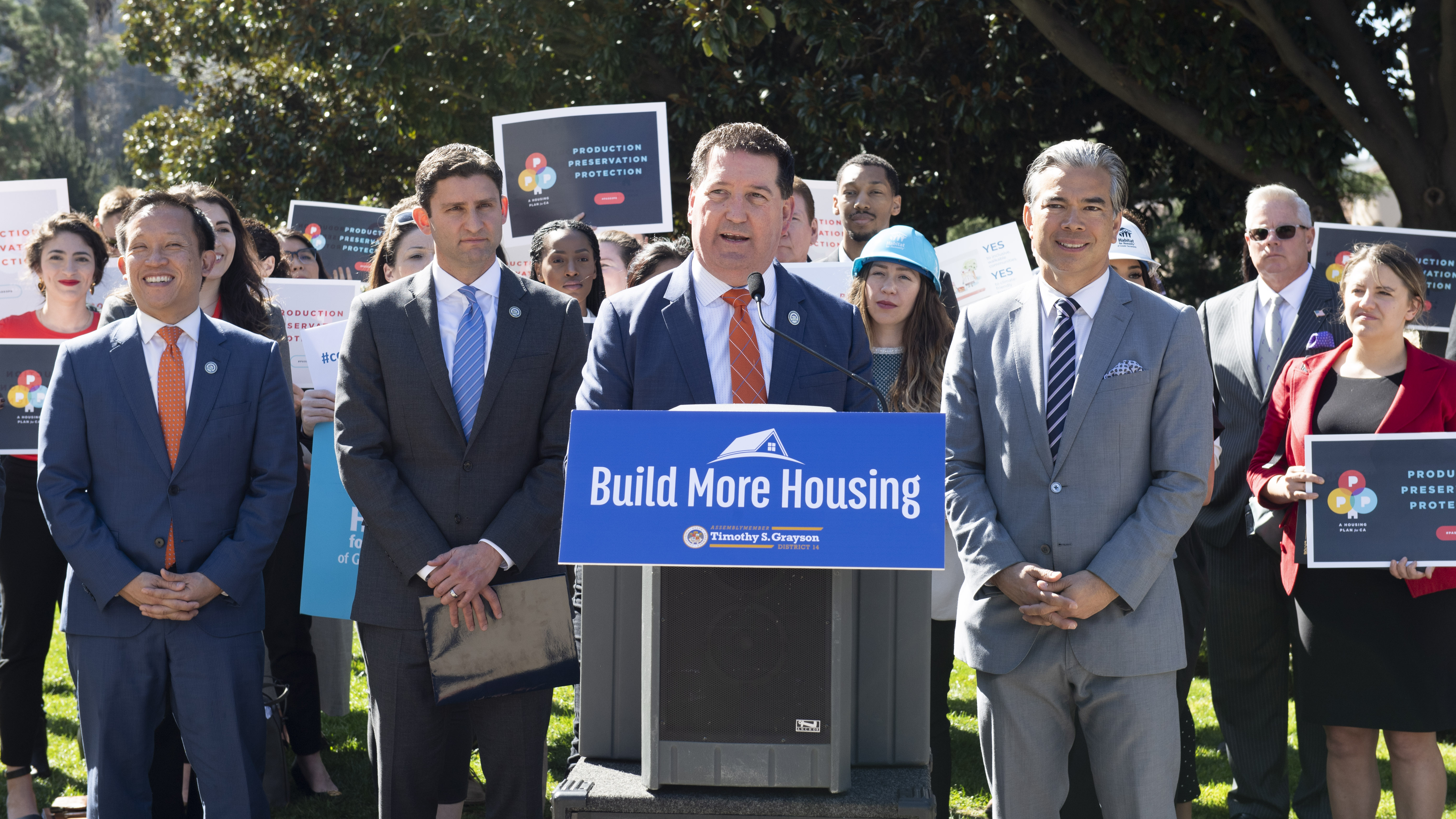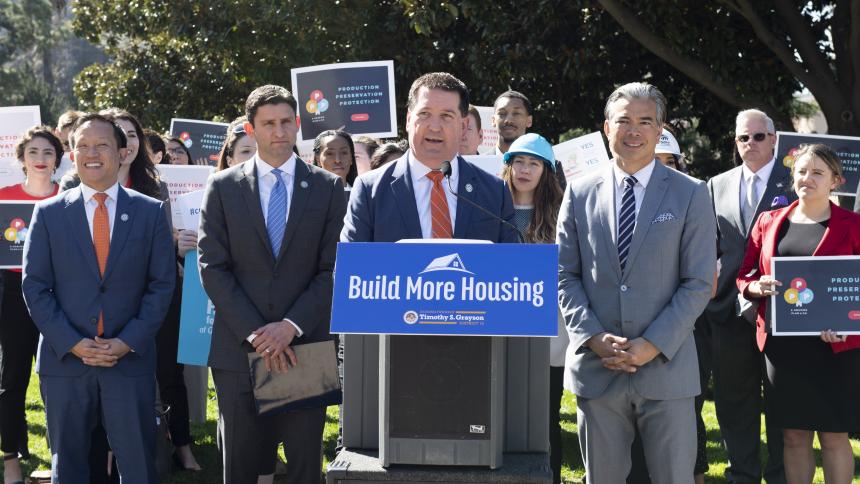
Sacramento, CA – Assemblymembers Tim Grayson (D-Concord), David Chiu (D-San Francisco), Rob Bonta (D-Oakland), Todd Gloria (D-San Diego), and Jesse Gabriel (D-San Fernando Valley) announced a package of bills today to spur housing production and ensure that local fees on development align with California’s statewide housing goals.
“Between the stories I’ve heard from communities across our state and the extensive studies conducted on the costs of housing, it has become clear to me that we simply cannot achieve our ambitious housing goals without working to reform fees that are exclusionary and regressive,” said Assemblymember Grayson. “Today my colleagues and I have put forward a package to dramatically increase our housing supply, produce housing that is attainable for working families at all income levels, and ensure that fees being placed on new development are justified.”
A report conducted by UC Berkeley’s Terner Center found that development fees can compromise up to 18% of the cost of a new home. In some jurisdictions, developers pay as much as $157,000 in fees on each single family home constructed.
“We have to face facts—it is extremely expensive and difficult to build housing in California,” said Assemblymember Chiu. “With a 3.5 million housing unit shortage, we have to find ways to encourage housing production. Lessening the amount of impact fees will make it easier and less expensive to build the housing we so desperately need.”
“All Californians deserve a safe and secure roof over their heads, and in order to do this we need to have a better understanding of the housing crisis at hand,” said Assemblymember Bonta. “AB 3146 will address a vital problem in the lack of available or standardized data assets. My bill will drive better evidence-based decision-making by gathering more usable data and statistics from local jurisdictions to help strategically solve our housing crisis.”
“I am proud to stand with my colleagues to bring much needed reform to the way California imposes fees on development projects,” said Assemblymember Todd Gloria. “This package of bills ought to be seen as complimentary of the Assembly’s work to find a significant, ongoing investment to replenish the revenue lost since the dissolution of Redevelopment. Reform and revenue are not mutually exclusive of one another.”
“Solving our housing crisis must be an urgent priority,” said Assemblymember Gabriel. “This legislation will help to responsibly increase our housing supply and lower the overall cost of building new housing.”
For our affordable housing partners like Habitat for Humanity, whose financing is already stretched to the limit, out of control fees can push homeownership out of reach for a family in need.
Director of Development for Habitat for Humanity of Greater Sacramento, Laine Himmelmann, spoke directly to the impact that fees can have on affordable housing developers and hardworking, low-income families: “There is no white horse to solving the current housing crisis impacting our state of California and local communities, it will take many partners and people and agencies working together through a variety of creative solutions and collaborations to get us where we need to be. But one thing is clear: we need to build more affordable homes and lowering these often crippling impact fees for affordable housing developers is a step in the direction to help make that possible.”
The following bills form the package to reform the way that development fees are determined, assessed, justified, and financed in California:
AB 1484 (Grayson): Provides a comprehensive reform of the nexus standards that cities and counties use to determine their fees.
AB 1924 (Grayson): Requires jurisdictions to assess fees on a per-square-foot basis, giving developers the option to build smaller, more affordable units without being penalized with multiple fees.
AB 3144 (Grayson): Provides state funding to reimburse local governments who waive impact fees on affordable projects.
AB 3145 (Grayson): Establishes a ceiling for development fees based on the median home price in a jurisdiction. Cities and counties that exceed this ceiling will be required to seek approval from the Department of Housing and Community Development, and justify the need to do so.
AB 3146 (Bonta and Grayson): Requires cities and counties to report a wide variety of essential housing data to the Department of Housing and Community Development, including the number of new housing units that have been issued a completed entitlement, a building permit, or a certificate of occupancy. Housing data that is accurate, valuable, and timely will support smart solutions to our housing affordability crisis.
AB 3147 (Gabriel): Ensures that certain impact fees are payable under protest. This allows for a developer to pay a fee they consider to be unreasonably high so they can continue construction, even as they negotiate for a more reasonable amount.
AB 3148 (Chiu): Reduces the impact fees paid on affordable housing units that are built using the state’s density bonus program.
AB 3149 (Gloria): Modernizes the way that local agencies notify interested parties prior to levying a new fee or service charge or prior to approving an increase in an existing fee or service charge.
###
